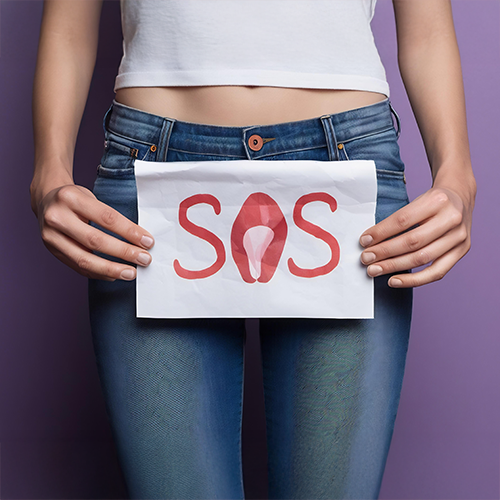Understanding the Difference between PCOS and PCOD

“Doctor, umm… I’ve been hearing about PCOS and PCOD everywhere. Are they the same or different?”
This is probably one of the most common questions women ask during consultations, and honestly, it’s not surprising. The terms are used so casually that they often create confusion, fear, and a lot of unnecessary anxiety. So, let’s make the meaning of the terms clear in simple language.
Think of this as a friendly conversation rather than a class lecture, for an easy understanding. We’ll talk about what PCOS and PCOD mean, how they affect women, their symptoms, causes, and yes, what you can actually do about them. Because knowing the difference is the first step toward taking control of your health.
Table of Content:
- Umm… What Exactly Is PCOD?
- Okay, So Then What Is PCOS?
- The Key Differences: PCOS vs PCOD
- Common Symptoms Women Shouldn’t Ignore
- Why Does This Happen? (Causes)
- Diagnostic Tests You May Need
- Treatment: PCOD vs PCOS
- Lifestyle Tips That Work for Both
- Emotional Wellbeing Matters Too
- Conclusion
Umm… What Exactly Is PCOD?
PCOD stands for Polycystic Ovarian Disease. The keyword here is “disease,” but don’t panic, it’s not as scary as it sounds. In PCOD, Many immature or partially developed eggs are produced by the ovaries. They become little cysts instead of being expelled during ovulation. This may result in symptoms including weight gain, irregular periods, hair loss, or even acne, as well as a minor enlargement of the ovaries. The good news is that PCOD may frequently be controlled by altering one’s lifestyle. Yes, it is true; occasionally, minor adjustments to routine, exercise, and diet can have a significant impact.
Okay, So Then What Is PCOS?
PCOS, on the other hand, is Polycystic Ovary Syndrome. Notice the word syndrome. That’s important because a syndrome means a group of symptoms that happen together. Compared to PCOD, PCOS is seen as more severe. In addition to producing immature eggs, PCOS causes the ovaries to release higher-than-normal amounts of androgens, which are masculine hormones. Infertility, ovulation disruption, and an increased risk of chronic conditions including diabetes, hypertension, and heart disease can result from this hormonal imbalance. Yes, it does sound heavier than PCOD, and it is in many respects.
The Key Differences: PCOS vs PCOD
You might be thinking, for more ways to identify the difference between PCOS and PCOD to conclude which one you or your loved one might have. Let’s simplify with a comparison:
1. Nature
- PCOD: It is a common hormonal imbalance or poor lifestyle-related condition.
- PCOS: Whereas PCOS is a metabolic and endocrine disorder with more serious complications.
2. Severity
- PCOD: It is relatively mild and easily manageable with routine changes and lifestyle improvements.
- PCOS: It is more complex than pcod, and often requires medical treatment and monitoring.
3. Hormones
- PCOD: May or may not involve major hormonal imbalance.
- PCOS: Strongly linked to increased androgen levels.
4. Fertility
- PCOD: Women with PCOD has chances to conceive with minor assistance.
- PCOS: Whereas PCOS make conception more difficult and may need fertility treatments.
5. Risk Factors
- PCOD: Less associated with long-term health risks.
- PCOS: Greater risk of diabetes, obesity, and cardiovascular problems.

Common Symptoms Women Shouldn’t Ignore
Both PCOS and PCOD may show overlapping symptoms, which is why the confusion exists in the first place. Some of the tell-tale signs include:
- Irregular or missed periods
- Sudden weight gain, especially around the abdomen
- Acne or oily skin
- Hair thinning or hair loss (especially near the crown)
- Excessive facial or body hair (hirsutism)
- Difficulty in conceiving
- Mood swings and fatigue
If you’re nodding your head and thinking, “Yes, yes, I do experience some of these,” then it’s time to see a doctor and go for a proper screening.
Why Does This Happen? (Causes)
Here’s the thing, both PCOD and PCOS don’t have a single cause. Instead, they are triggered by a combination of factors:
- Hormonal imbalance (insulin resistance, high androgens)
- Genetics (if your mother or sister has it, you might be more prone)
- Lifestyle choices (sedentary life, unhealthy food habits, stress)
- Obesity (or rapid weight fluctuations)
So, it’s not something you “caused.” It’s not your fault. But yes, you can definitely manage it.
Diagnostic Tests You May Need
Hmm, so how do doctors confirm whether it’s PCOS or PCOD? It is easily confirmed with help of a few diagnostic tests-
- Ultrasound to check ovaries for the cysts.
- Blood tests to measure hormone levels.
- Insulin and glucose tests to check for insulin resistance.
- Thyroid function test since thyroid disorders can mimic these symptoms.
These tests together help doctors make the right diagnosis.
Treatment: PCOD vs PCOS
Now comes the big question: Can it be treated? The answer is, absolutely! But the treatment varies depending on whether it’s PCOD or PCOS.
PCOD Management
- Lifestyle changes: Lifestyle improvement helps alot in PCOD. Like healthy diet, exercise, stress management should be the part of your lifestyle.
- Mild medications for cycle regulation.
- Natural remedies like yoga and balanced nutrition.
PCOS Management
- Requires medical intervention for hormone regulation.
- May involve insulin sensitizing drugs like Metformin.
- Fertility treatments are needed, if conception is difficult.
- Long-term monitoring for diabetes and heart health.
Lifestyle Tips That Work for Both

Regardless of whether it’s PCOS or PCOD, the foundations of good health remain the same:
- Eat a balanced diet rich in fibre and lean protein.
- Limit processed foods and refined sugars.
- Exercise at least 30 minutes a day (even brisk walking works wonders).
- Maintain a healthy weight.
- Sleep well, 7 to 8 hours a night.
- Reduce stress with meditation, yoga, or simple hobbies.
Trust me, these small steps can bring huge improvements.
Emotional Wellbeing Matters Too
Many women quietly suffer emotionally when dealing with PCOS or PCOD. Umm… the constant acne, the hair fall, or irregular periods can affect confidence and relationships. But please remember, you’re not alone. Millions of women in India and worldwide are managing these conditions successfully. Getting help from friends, relatives, or even a counselor might be just as crucial as getting medical attention.
Conclusion
So, PCOS and PCOD are not the same, but they’re closely related. PCOD is more common, less severe, and often manageable with simple changes. PCOS is more complex, with higher risks and needs closer medical attention. Both, however, can be handled effectively if diagnosed early and treated properly.
The key takeaway? Listen to your body. If something feels off, don’t brush it aside. Go for a consultation, get your screenings done, and take the first step towards better health. Hmm, yes, it may sound overwhelming, but once you understand what’s happening, you’ll see that the solutions are very much within your reach.



